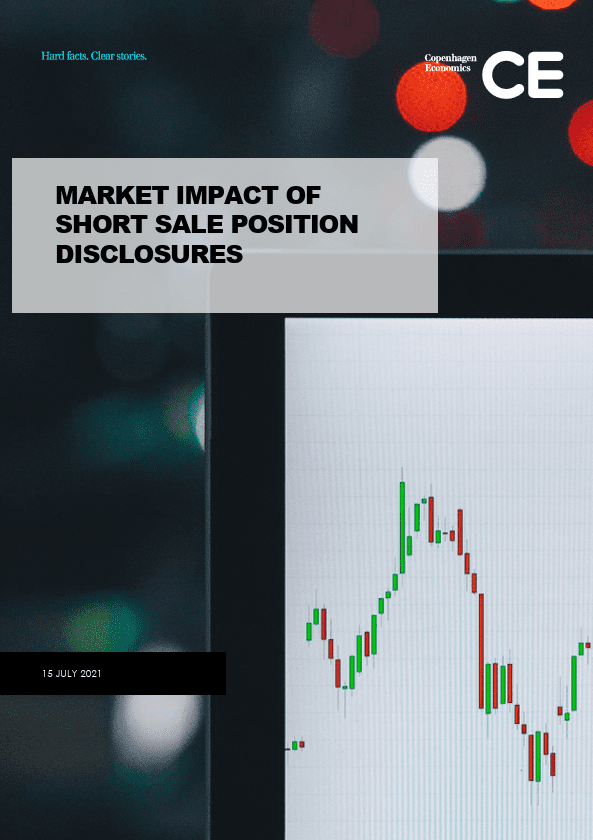Research blog: Public manager short selling disclosures harm markets
Current EU regulations require individual short positions to be disclosed publicly if they exceed 0.5% of issued share capital. Regulators receiving information on a managers’ short positions above a reasonable threshold is appropriate if kept confidential. Research from Copenhagen Economics shows that disclosure requirements that publicly reveal the identity of the investment manager can have unintended negative effects on markets and investors, including pension funds and foundations. The white paper, Market Implications of Short Sale Position Disclosures, analyzes data from seven European countries and finds that such disclosure requirements:
-
Reduce market efficiency by discouraging investors from short selling above the reporting threshold.
-
Lower investor returns since increased public short sale disclosures correlate with stock price declines.
-
Increase market volatility by encouraging herding behavior, leading to exaggerated price movements and instability.
Disclosure requirements used in other jurisdictions such as the UK and U.S. provide markets with anonymized net short positions aggregated by issuer. This approach provides investors with decision-useful information without discouraging short selling or harming markets.
Short selling is essential for strong capital markets. It helps uncover corporate misconduct, enhance price discovery and market efficiency, improve liquidity, reduce volatility, and facilitate risk management. The Copenhagen Economics white paper demonstrates that the design of public disclosure requirements is important; getting it wrong can discourage short selling, to the detriment of both markets and investors.
Current EU short sale disclosure requirements harm markets and investors by:

Decreasing market efficiency
The study finds that the EU’s current approach to short sale disclosure requirements can reduce market efficiency as investors avoid trading to stay below the reporting threshold – currently 0.5% of the company’s issued share capital. The research shows significantly fewer trades above this threshold, as investment managers shy away from public disclosures that can lead to retaliation, copycat behavior, and the exposure of proprietary trading strategies. Data suggests that those near the threshold are far less likely to increase their short positions, even when economically beneficial. This reluctance decreases market efficiency.
Lowering returns
The study also finds that the EU’s current short sale disclosure rules are linked to lower stock returns. An increase in disclosed short positions correlates with a 0.3% drop in weekly stock returns. These findings are consistent with other research showing similar effects. Lower returns ultimately harm investors, including pension funds, with potential consequences for the retirement security of millions of Europeans.


Increasing volatility
The paper further finds that the current disclosure rules contribute to greater market volatility. When one investment manager’s short position is available publicly, others frequently follow suit—a phenomenon known as herding behavior. However, copycat traders may not fully understand the rationale behind the original short positions. This uninformed decision-making can lead to exaggerated price movements and sudden, disorderly exits from positions. Short selling typically reduces volatility by helping to correct overvalued stocks and improve market efficiency. Consequently, the current approach to disclosures amplifies volatility and disrupts normal market functioning.
Unintended consequences
Although individual manager disclosure rules aim to promote transparency and informed decision-making, the evidence suggests they have the opposite effect. This research shows that market distorting regulations reduce market efficiency, lower investor returns, and increase volatility by encouraging herding behavior and deterring short selling. Instead of mitigating the perceived risks of short selling, the requirements to disclose individual manager short positions publicly introduce new risks, ultimately harming markets and the very investors the regulations aim to protect.
Methodology
The paper analyzes the impact of short selling disclosure regulations using the unique regulatory structures of several European countries to examine investors’ actions just above and just below the disclosure threshold. EU countries typically only provide data on short sales that exceed a certain threshold for mandated public disclosure. Denmark, however, provides data on short sales that are both above and below the disclosure threshold. The authors used this difference in regulations to identify the effects of disclosure rules on investors’ behavior in European countries.

